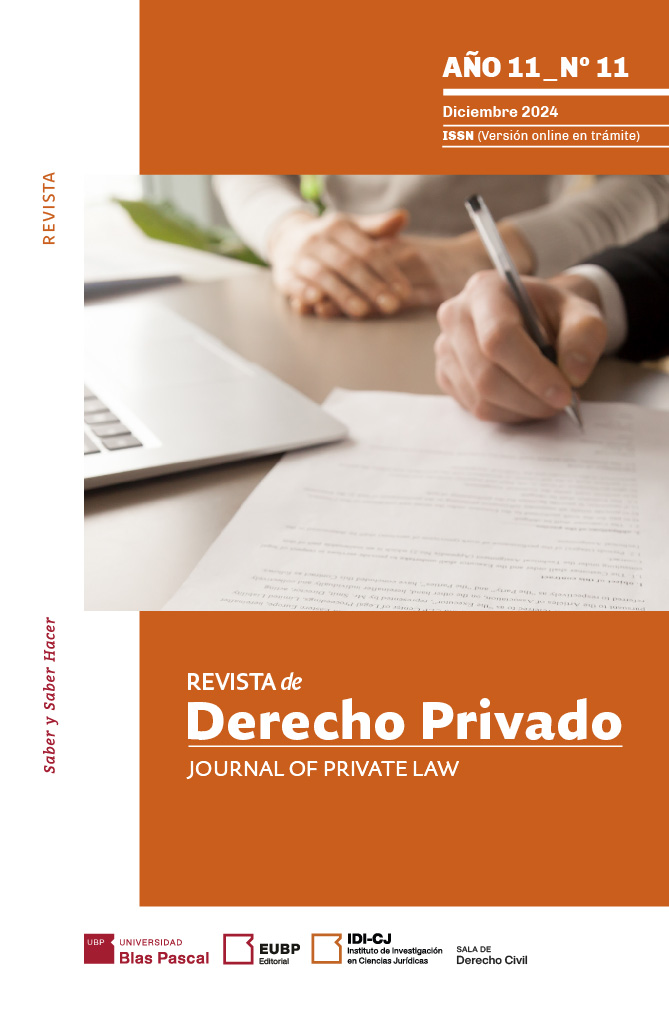The role of the teacher in AI-assisted teaching and learning
DOI:
https://doi.org/10.37767/2362-5325(2024)012Keywords:
Teaching, Pedagogical mediation, Generative AI, Competencies, EthicsAbstract
Since the enactment of the Higher Education Law in Argentina, the analysis of the way teaching has been focuced in Higher Education and its effectiveness has been intensified.
In the way of learning, the educational act is fundamental. It is not an implicit assumption
or belief that is taken for granted, nor are the skills/capabilities of the student. And in the training of law professionals today we are not just talking about the use of technologies like merely manipulating of them. The rapid evolution places us facing the integration of Artificial Intelligence (AI), and more recently the Generative Artificial Intelligence.
Reevaluating our role as teachers in front of a student body that learns from, about, and with AI is a new point in the teaching of law. The professor is an essential mediator of knowledge and a promoter of the development of skills and competencies that enable learning and the construction of new knowledge.
Therefore, learning with AI must be approached from an ethical perspective because technology is never ideologically neutral. The algorithms that form it expose and privilege certain worldviews, and particular ways of thinking, learning, and knowing that, without ethics, become dangerous. Additionally, actions are needed to preserve and safeguard human intellectual skills, the diversity of our knowledge system, and to place technology in its service.
References
COLOMBATO - CAJIGAL - SOTO, Proyecto de Investigación: “La enseñanza del derecho civil en perspectiva bioética y de derechos humanos”, RESOLUCIÓN FCEyJ N° 201/24.
Cobo, Cristóbal (2023) Foro Internacional Academia (Virtual Educa, Medellín) Conferencia: ¿Cómo formamos personas inteligentes en tiempos de verdades artificiales? Disponible en: Inteligencia Artificial y Educación. ¿Pensamos críticamente? Apuntes para Docentes.
Cobo, Cristóbal (2023) Foro Internacional Academia (Virtual Educa, Medellín) Conferencia: ¿Cómo formamos personas inteligentes en tiempos de verdades artificiales? Disponible en: Inteligencia Artificial y Educación. ¿Pensamos críticamente? Apuntes para Docentes.
Disponible en: https://www.youtube.com/watch?v=Va0rLnbHaK0
DÍAZ, Barriga Frida, Rigo Marco Antonio. “Realidades y paradigmas de la función docente”. México: Anuies; 2000. Pág. 55.
Guajardo Espinoza José María y Rivera Morales María Teresa. “El acto educativo y los retos de la acción de enseñar”, en Docencia: pensamiento y práctica, Editorial Porrúa SA, 2018, México.
Ley Nº 24.521/95 modificada por Ley N° 27.204/2015, entre otras.
Lipman, Marilina (2023) “La evaluación en los nuevos escenarios educativos” Capacitación Docente para Docentes de UGR. Disponible en: La evaluación en los nuevos escenarios educativos.
Maguregui Carina, Inteligencia artificial: anatomía de un buen «prompt», 2024. EDUC.AR. Disponible en: https://www.educ.ar/recursos/159081/inteligencia-artificial-anatomiade-un-buen-prompt
Monereo, Carles & Castelló, Montserrat & Gómez, Isabel. (2009).” La evaluación como herramienta de cambio educativo: evaluar las evaluaciones”. Repensar la evaluación para cambiar la enseñanza, Graó Editors.
Nassif Ricardo, Pedagogía General, Editorial Kapelusz, 1958.
Prieto Castillo, Daniel - Gutiérrez Pérez Francisco. “La mediación pedagógica”. Ediciones CICCUS, 1999.
Rinesi Eduardo, “El derecho a la educación superior”, Anales de la Educación Común, 2022, Vol. 3, N° 1-2.pp. 72-79 72. Disponible en: https://cendie.abc.gob.ar/revistas/index.php/revistaanales/article/view/1530/1825
Round Table New approaches to the right to Higher Education (IESALC & UNESCO PLS/EDP) EN, disponible en: https://www.youtube.com/live/aKZO__AllqY
Sabzalieva, Emma, Gallegos, Daniela, Yerovi, Clarisa; Chacón, Eglis, Mutize, Takudzwa; Morales, Diana y Cuadros, José Andrés; El derecho a la educación superior: una perspectiva de justicia social. UNESCO 2022ISBN 978-980-7175-69-2. Disponible en: https://unesdoc.unesco.org/ark:/48223/pf0000382285
Soto, Mariana Estefanía, “Competencias del estudiantado frente a la inteligencia artificial”. marzo de 2024. Jornadas Preparatorias de las XXIX Jornadas Nacionales de Derecho Civil”. FCEyJ. https://www.eco.unlpam.edu.ar/jornadas-preparatorias-de-lasjndc-y-i-jornada-de-inteligencia-artificial/
Soto, Mariana Estefanía, “El método de casos como estrategia de enseñanza y de valoración de aprendizajes en entorno virtual” Comisión 11, Enseñanza del derecho, XXVIII Jornadas Nacionales de Derecho Civil, disponible en: https://drive.google.com/file/d/1Cc8w4cb5IzlRU10E_YAn_x9lY1A1LFc4/view?usp=sharing
“La IA generativa y el futuro de la educación”. UNESCO, junio 2023. Disponible en: https://unesdoc.unesco.org/ark:/48223/pf0000385877_spa

